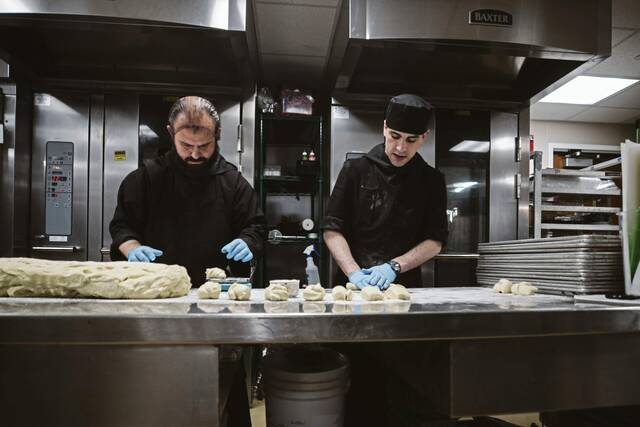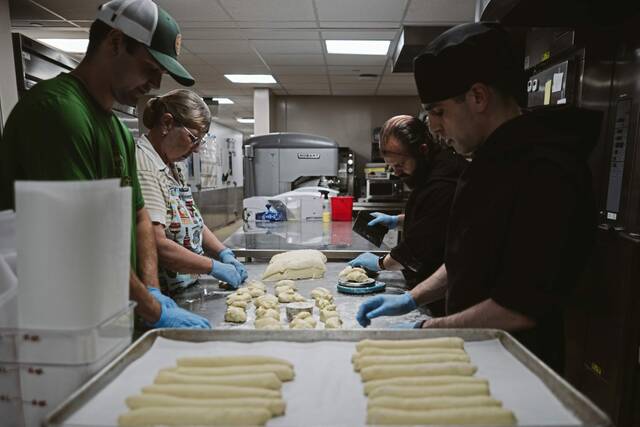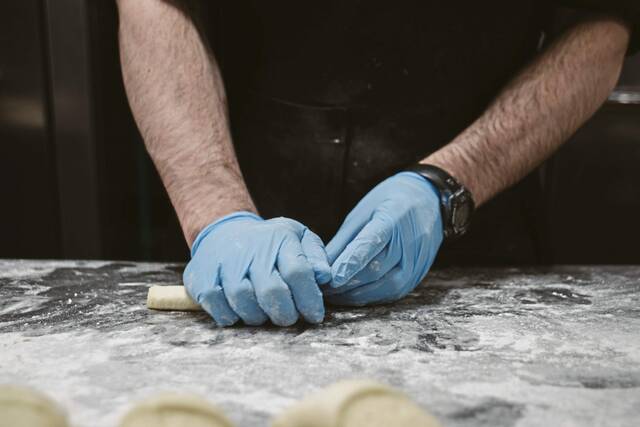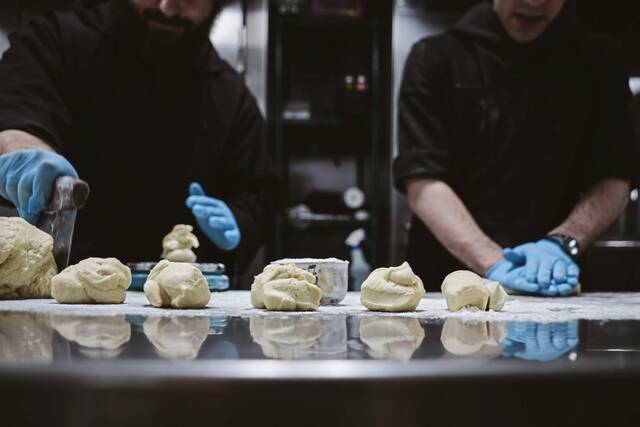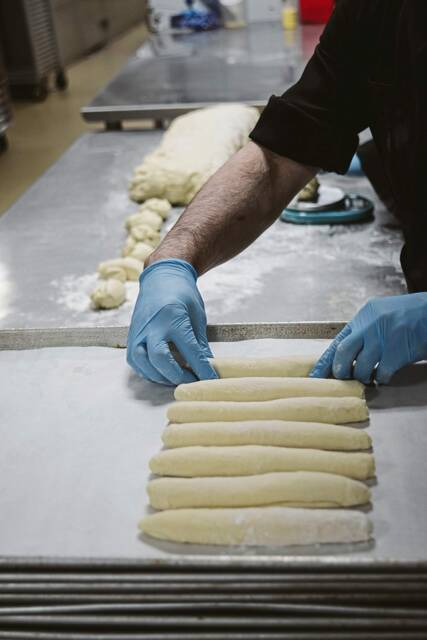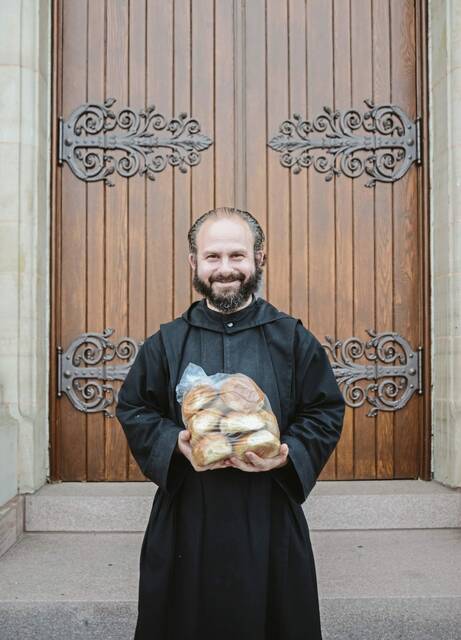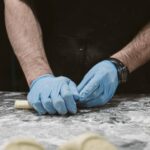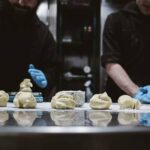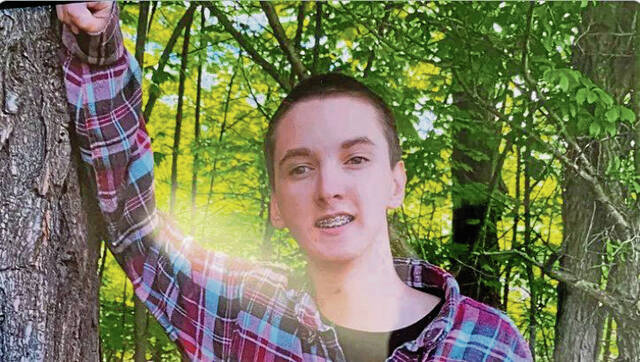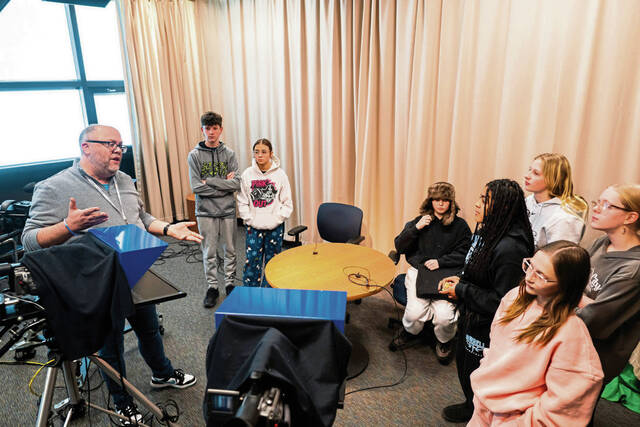Wiping flour from his brow, Brother Angelo Lichtenstein, 33, prays as he kneads fresh dough in preparation for an upcoming bake sale at the Saint Vincent Gristmill.
The Benedictine monk prays over everything he bakes, from bagels to brioche.
“Baking is one way that we can participate in God’s role as creator,” Lichtenstein said.
Millennial monks with a vision are steering the 169-year-old gristmill into the future, staying true to their monastic beliefs and engaging the community with a new venture: bake sales.
Tucked away in Unity, the gristmill has been an integral part of the community since 1854, when the Rev. Boniface Wimmer and his 18 followers left Bavaria for the mountains of western Pennsylvania and started the first Benedictine monastery in the United States. Immediately upon arrival, they decided to build a gristmill to store and grind wheat and other grains.
The gristmill runs on the same burrstone imported from France at its founding. Made from freshwater quartz, the hard rock simply needs to be sharpened with a special hand pick every eight years in order to regain its precision.
Insurance problems in the 1990s seemed to leave no option but to demolish the structure, but foundations in the area including the Allegheny Foundation of Pittsburgh and the Katherine Mabis McKenna Foundation of Latrobe chipped in to preserve the last remaining vestige of Wimmer’s original plant, and the gristmill is now on the National Register of Historic Places and houses a museum and general store.
Producing high-quality bread and flour has always been a part of the gristmill’s history. At its peak in 1913, the mill ground enough flour to make more than 150,000 loaves of “Saint Vincent Bread” for students from Saint Vincent College and Seminary. During the Great Depression, the gristmill produced bread at a very low cost to community members, and in 2022, a few millennial monks decided to start a bake sale.
Head baker Lichtenstein combines the value of home-cooked food, which he inherited from his full-blooded Italian mother, with his love for numbers from his time as a physics major at The Citadel in South Carolina.
For Lichtenstein, it’s all about the numbers. He memorizes ingredient amounts, batch sizes and how much dough it takes to make 528 hot dog buns — 117 pounds.
He initially only baked for members of the monastic community and close friends.
“But then people started asking me, ‘Can I buy stuff from you?’” Lichtenstein said. “I was like, ‘I don’t know,’ and then we did our first bake sale and we’ve kept doing bake sales since.”
Brother Xavier O’Mara, 38, was a student at Saint Vincent College, joined the ranks as an admissions counselor for nine years and then discerned he was being called to something more. In July of 2018, he became a monk.
O’Mara originally experienced Lichtenstein’s baking as a first-year monk when Lichtenstein discovered a recipe for Crock-Pot banana bread.
“It was amazing,” O’Mara said.
Bake sale success
When Lichtenstein decided to test if a bake sale was feasible, he immediately asked O’Mara for advertising help. Their first product? Hot-cross buns.
“The magic thing about these hot-cross buns is they’re filled with raspberry jam,” O’Mara said. “Angelo fills them all by hand.”
For their first sale, a team of monks helped to prepare about 1,100 buns.
“It was just an idea, an intriguing thought,” O’Mara said. “We thought this might be a money-making operation for the monastery, and that it could help a lot of people.”
At that first bake sale they realized they’d grossly underestimated demand.
“It didn’t stop from there,” O’Mara said. “We’ve been growing ever since we started. We did the bake sales once or twice a quarter, and now we’re offering bake sales once or twice a month.”
For Easter 2023, they sold out in 50 minutes, with customers coming from as far as Maryland and Ohio.
Despite their success, the monks remain faithful to the tradition and mission of Saint Vincent.
Bread has long been a symbol of Christian faith, from Sunday morning communion to the Israelites’ manna in the wilderness, and the practice of creating bread and baked goods fits into the Benedictine motto of “ora et labora,” or “to pray and to work.”
Lichtenstein was asked to deliver some talks at parishes in the Diocese of Greensburg — “Bread and the Blessed Sacrament” — in the aftermath of the bake sale’s success.
“As Catholic believers, a source and summit of our faith is in the Eucharist,” he said. “Our Lord chose bread as the matter for him to become sacramentally present to us until the end of time, so it’s definitely significant.”
Lichtenstein is planning to write about the importance of bread in a book which will hopefully come out next Christmas. While it’s in the “very, very early stages,” Lichtenstein says it will be a serious book of technique complete with spiritual and philosophical reflections about bread and baking.
“The book will reflect on monastic life and how monastic spirituality pairs with baking and being a baker,” he said.
He also views the bake sale as a communal space where people can catch up with old friends or meet new ones.
“We’re pretty big on hospitality and ministering to our guests and treating them as Christ,” he said. “We feed them as if they were Christ. We feed them our best.”
O’Mara agrees. To him, it’s about more than selling food and making a profit.
“The idea of the product is that there is prayer involved, there is a degree of quality and care that goes into each and every baked good that we do,” O’Mara said.
O’Mara added that the bakers use all-natural ingredients and no chemicals. All the products are freshly baked by monks and anyone else that wants to help. From summer interns to retired adults volunteering in their free time, the bakery is a busy space that brings them together.
Volunteers in the kitchen
RJ Kenna, senior business major at Saint Vincent, volunteers in the kitchen with the monks when he has a free evening.
Carefully watching Lichtenstein’s technique, Kenna gingerly rolled out his hot dog buns while discussing the importance of the bake sale.
“I like being able to come over and clear my head,” he said. “I love how precise Brother Angelo is. It’s not something you find often, especially in today’s fast world.”
Mary Jo Welty, a parishioner at Saint Vincent Basilica Parish in Latrobe, enjoys volunteering at the gristmill’s General Store every other Wednesday.
“It’s an asset to our community to still be here,” she said.
The General Store provides whole wheat, unbleached white, rye and buckwheat flours and corn meal, as well as specialty breads. The wheat comes from a farm in New Alexandria, is ground in-house and sent to Friendship Farms to be made into bread. The General Store also shares products from other monasteries and abbeys, as well as items handcrafted by some of the monks at Saint Vincent, including Brother Mark Floreanini’s stained glass crosses, rosary mugs and pottery yarn holders.
“There’s a degree of care that people see with monastic baked goods,” O’Mara said. “People go out of their way to buy them, because they know it takes a lot of time, a lot of care and a lot of prayer.”


